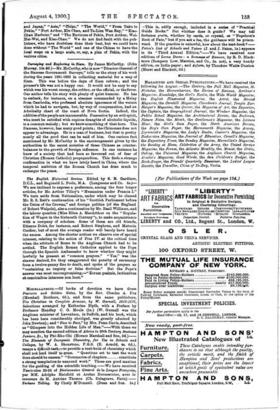The English Historical Review. Edited by B. R. Gardiner, D.C.L.,
and Reginald L. Poole, M.A. (Longmans and Co. 5s.)— We are inclined to express a preference, among the four longer articles, for Mr. Arthur Tilley's "Humanism under Francis I." We turn aside from Nationalism, under which may be classed Mr. R. S. Raft's continuation of his "Scottish Parliament before the Union of the Crowns," and foreign politics (of the England of Robert Walpole), also a continuation by Mr. Basil Williams, and the labour question (Miss Ellen A. MacArthur on the "Regula- tion of Wages in the Sixteenth Century"), to make acquaintance with a company of scholars. Some of them are old friends, Etienne Dolet, for instance, and Robert Stephens, and Maturin Cordier, but of most the average reader will barely have heard the names. Among the shorter notices we observe one of special interest, relating to the action of Pius IV. at the ceitical time when the attitude of Rome to the Anglican Church had to be settled. The English Roman Catholics applied to the Pope through the Spanish Ambassador to know whether they might lawfully be present at "common prayers." "Yes," was the answer desired, for they exaggerated the penalty of recusancy from a twelve-penny fine to death, and spoke of the prayers as "containing no impiety or false doctrine." But the Pope's answer was most uncompromising,—" Eorum psalinis, lectionibus et concionibus interesse non licet."


































 Previous page
Previous page